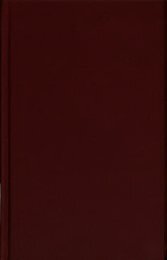Country Profile: Cuba - American Memory - Library of Congress
Country Profile: Cuba - American Memory - Library of Congress
Country Profile: Cuba - American Memory - Library of Congress
You also want an ePaper? Increase the reach of your titles
YUMPU automatically turns print PDFs into web optimized ePapers that Google loves.
<strong>Library</strong> <strong>of</strong> <strong>Congress</strong> – Federal Research Division <strong>Country</strong> <strong>Pr<strong>of</strong>ile</strong>: <strong>Cuba</strong>, September 2006<br />
country’s 169 municipalities is governed by a municipal assembly, which elects a municipal<br />
committee, whose president functions as mayor. Municipal assembly delegates serve for two and<br />
one-half years. Nominations for municipal assembly elections come from regional assemblies at<br />
the precinct level.<br />
Judicial and Legal System: A civil law state, <strong>Cuba</strong> has a legal system that is based on Spanish<br />
and <strong>American</strong> law but influenced by communist legal theory. <strong>Cuba</strong>’s inquisitorial system <strong>of</strong><br />
criminal procedure emphasizes written codes rather than precedent as the source <strong>of</strong> law. There<br />
are no jury trials, and most trials are public. The courts are key institutions in law enforcement<br />
and also seek to educate the population about their rights and obligations. The provincial courts<br />
exercise jurisdiction over crimes for which punishment will not exceed eight years; about threequarters<br />
<strong>of</strong> all crimes fall within their realm. Municipal courts serve as trial courts at the lowest<br />
level, and they have jurisdiction over minor crimes that typically carry a penalty <strong>of</strong> imprisonment<br />
for less than one year or small fines. They are also the courts <strong>of</strong> first instance in civil and labor<br />
cases. Municipal trials are always held before a panel <strong>of</strong> three judges. All <strong>of</strong> <strong>Cuba</strong>’s courts have<br />
both pr<strong>of</strong>essional and lay judges. Pr<strong>of</strong>essional judges are selected through a competitive<br />
examination administered by the Ministry <strong>of</strong> Justice. About half <strong>of</strong> <strong>Cuba</strong>’s judges are members<br />
<strong>of</strong> the <strong>Cuba</strong>n Communist Party, and an even higher proportion <strong>of</strong> party members is evident in the<br />
Supreme Court. <strong>Cuba</strong>n courts are very harsh in their treatment <strong>of</strong> the political opposition. <strong>Cuba</strong>ns<br />
can be jailed for speaking ill <strong>of</strong> their rulers or for organizing groups to contest political power.<br />
Electoral System: Elections for the National Assembly are held in multimember districts.<br />
Voters have three choices: vote for the single <strong>of</strong>ficial slate, vote for some <strong>of</strong> the candidates on<br />
the <strong>of</strong>ficial slate (but never for opposition party candidates), or cast a blank ballot. To be elected,<br />
a candidate has to receive more than half <strong>of</strong> the valid votes cast. Elections to the National<br />
Assembly take place every five years. No candidate failed to be elected in the 1993 and 1998<br />
National Assembly elections. The last elections for the National Assembly and provincial<br />
assemblies were held in January 2003; the next elections are slated for January 2008. Municipal<br />
elections were last held in April 2005 and are next due in October 2007.<br />
Political Parties and Politics: The <strong>Cuba</strong>n Communist Party (Partido Comunista de <strong>Cuba</strong>—<br />
PCC) has governed <strong>Cuba</strong> since 1965. The PCC is the only legal political party and exercises de<br />
facto control over government policies. Major issues are debated at periodic party congresses,<br />
the fifth <strong>of</strong> which was held in October 1997. These congresses adopt the party’s statutes and<br />
programs and choose the membership <strong>of</strong> the Central Committee and Political Bureau. Key issues<br />
are discussed more regularly in meetings <strong>of</strong> the Political Bureau, which includes <strong>Cuba</strong>’s most<br />
powerful leaders. The Central Committee, a much larger entity, meets annually and includes<br />
many key intermediate-level leaders.<br />
Mass Media: In the absence <strong>of</strong> any freedoms <strong>of</strong> speech and press, domestic media must operate<br />
under party guidelines and reflect government views. The state owns and operates all mass<br />
media except for publications <strong>of</strong> the Roman Catholic Church. The <strong>Cuba</strong>n government and<br />
Communist Party <strong>of</strong> <strong>Cuba</strong> (Partido Comunista de <strong>Cuba</strong>—PCC) strictly censor news, information,<br />
and commentary and restrict dissemination <strong>of</strong> foreign publications to tourist hotels. Laws against<br />
disseminating antigovernment propaganda, graffiti, and disrespect <strong>of</strong> <strong>of</strong>ficials carry prison<br />
penalties.<br />
25



![Albert Einstein Papers [finding aid]. Library of Congress. [PDF ...](https://img.yumpu.com/21604228/1/190x245/albert-einstein-papers-finding-aid-library-of-congress-pdf-.jpg?quality=85)





![American Colony in Jerusalem Collection [finding aid]. Library of ...](https://img.yumpu.com/17941275/1/190x245/american-colony-in-jerusalem-collection-finding-aid-library-of-.jpg?quality=85)



![Piccard Family Papers [finding aid]. - American Memory - Library of ...](https://img.yumpu.com/17941234/1/190x245/piccard-family-papers-finding-aid-american-memory-library-of-.jpg?quality=85)


